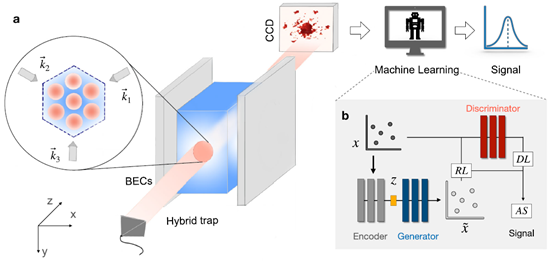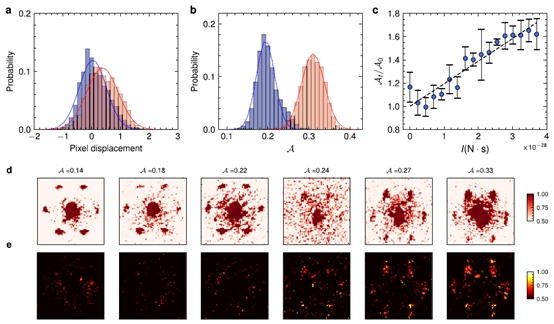2024-07-03
Machine Learning and Quantum Data Mining
Xiaopeng Li's team has conducted research on using artificial intelligence to enhance the detection sensitivity of quantum precision measurement. They proposed a brand-new, fully data-driven method to enhance the detection sensitivity to weak signals, without relying on any prior knowledge or assumptions about the physical system or sensing process.
In this new work, researchers used the wave nature of matter waves to sense weak forces and employed artificial intelligence methods to process various noises in the detection. By using a quantum data-driven approach, they improved the sensitivity of force perception by an order of magnitude (to the level of detecting forces around 10^-25 N), surpassing the standard quantum limit corresponding to classical mechanical force measurement methods. The artificial intelligence method, combined with data generated by quantum systems, processes quantum detection noise, technical noise, and thermal noise in the system in a completely automatic, zero-knowledge manner, providing a generative model for the digital twin of quantum systems.

Figure 1. Machine Learning-Assisted Atomic Force Sensing
In the presence of external forces, the artificial intelligence method developed by researchers can quickly detect an anomaly signal from the data generated by the quantum system, which has a signal-to-noise ratio ten times better than that of traditional signals. By calculating the anomaly score to quantify the atypicality of the input image compared to its digital copy, the detection sensitivity of the BEC system subjected to external forces is enhanced.

Figure 3. Perception Using Anomaly Scores
This data-driven signal processing method is highly universal and can be widely applied to sensing technologies in various fields. It not only improves sensitivity but also maintains long-term stability, opening up a new perspective for achieving large-scale quantum advantages. The relevant research results were published in Communications Physics, 7, 172, in June 2024. The first author of the paper is Tangyou Huang, a researcher at the Shanghai Qi Zhi Institute.
For more information, please refer to the paper:
Quantum force sensing by digital twinning of atomic Bose-Einstein condensates, Tangyou Huang, Zhongcheng Yu, Zhongyi Ni, Xiaoji Zhou & Xiaopeng Li*, Communications Physics, 7, 172 (2024).